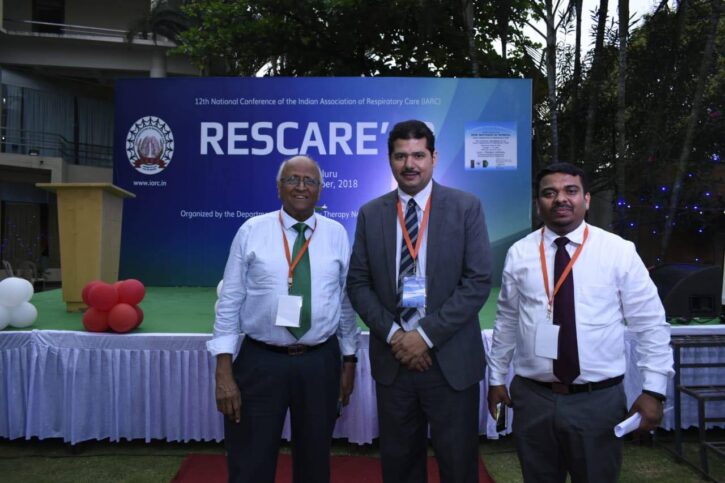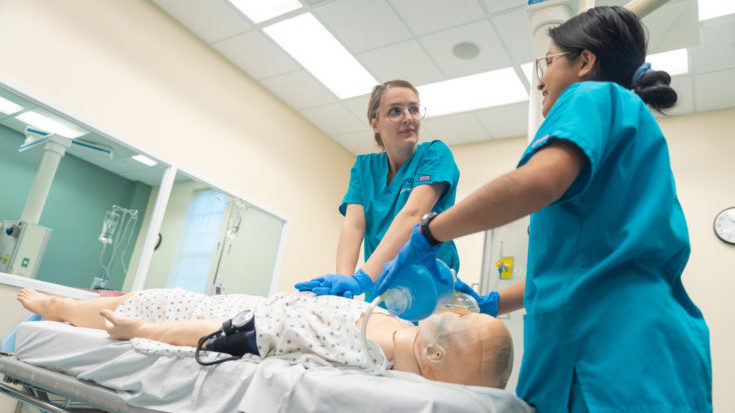
Last month, two Missouri community colleges became the first in the state to be permitted to offer a four-year bachelor’s degree program to their students. And both of them — Ozarks Technical Community College (OTC) in Springfield and St. Louis Community College in St. Louis — have chosen to focus on bachelor’s degrees in respiratory care.
Benefit to the community
Aaron Light, DHSc, RRT, RRT-ACCS, FAARC, is the respiratory therapy program director for the two-year program currently offered at OTC. He believes allowing community colleges to offer BS degrees, especially in areas like respiratory care, can add significant benefit to a community.
“One of the biggest expenses to a new RT program is the expense of labs and faculty,” he said. Community colleges with two-year programs already have the lab and equipment in place, which lessens the startup expenses. “Additionally, community colleges have lower tuition rates than most universities, so RT programs housed in community colleges could be attractive to students, as they offer a lower cost.”
Dr. Light says OTC was motivated to offer the BS degree in respiratory care because the school wanted to open a new program in an underserved area of the state, and CoARC now requires all new programs to be at the bachelor’s degree level. While he notes the program still has some hurdles to cross — it must be accredited by CoARC and gain approval from OTC’s Higher Learning Commission — he believes that when it is operational, it will ease demand for therapists in the area.
“We could create an additional 30 RT graduates every year to the central and southwest Missouri area,” he said.
Strong foundation
Missouri is just one of several states that have moved to allow bachelor’s degree programs at community colleges. Unfortunately, not all of the colleges that offer these programs offer degrees in respiratory care. Karen Simmons, BSRT, RRT, RRT-NPS, RPFT, director of clinical education for respiratory care at Trident Technical College in Charleston, SC, believes it’s time more of them did.
“I believe that community colleges already have a strong foundation for the respiratory program, and it makes sense to build upon this instead of trying to start fresh,” she said. “This is true for my state since we only have one BSRT program, and it is not a complete program.”
The degree completion program only offers an AS to BS option, and since it is offered at a private religious school, it doesn’t fit the needs of all students. She has approached her dean about the possibility of making her program a four-year program. For now, South Carolina doesn’t allow community colleges to offer bachelor’s degrees, so much work remains to be done. Simmons is currently enrolled in an MSRT program that is taking up a lot of her time. She says once she is finished, she would like to get involved in helping to change the law in South Carolina, hoping that a bachelor’s degree at Trident will one day be possible.
“We, as a profession, are pushing to elevate ourselves to the level of other disciplines in terms of educational levels, respect, and pay,” she said. “I think community college is an affordable way to support this.”
A few caveats
What do educators at the university level think of the idea of allowing community colleges to offer bachelor’s degrees?
Jerry King, MAEd, RRT, a program director in the Dean’s Office at the UAB School of Health Professions in Birmingham, AL, supports the concept. Still, he emphasizes it will be essential to ensure these programs meet rigid standards.
“We do not have enough programs in our state to meet the demands for RT staff,” he said. ”Our hospitals are starting to take on more procedures and currently have a staffing shortage. As long as the community colleges are meeting the same requirements for a BS degree — prerequisites and RT classes — this should improve the quality of education and benefit the RT profession.”
He says he will work with any associate’s degree program that’s interested in improving access to the BS degree for RTs, regardless of whether that means building bridge agreements between community colleges and universities or helping a community college convert their program to the BS level.
Top arguments in favor
The Community College Baccalaureate Association (CCBA) supports community colleges nationwide in their pursuit of bachelor’s degrees and was happy to learn about the additional two respiratory programs at the colleges in Missouri.
“I think one of the things that COVID-19 has highlighted is that health care is increasingly complex and that the roles of the RT and RN have expanded,” said CCBA President Angela M. Kersenbrock, EdD. “Their scope of practice has had to expand as well.” She believes community colleges are the right place to fill the need for that expanded scope of practice.
Here are her top arguments for the concept —
- The AS or AAS degrees in respiratory care are already successfully in place.
- These programs are already accredited and have a great level of quality.
- These colleges already have the necessary (and expensive) labs, as well as these very difficult-to-find faculty.
- The faculty in place understand the community college student, who is often older and has more responsibilities.
- When there is a critical need for these professionals, the last thing you want to do is have the student jump through unnecessary hoops to complete the program. Requiring them to transfer to a different university, a different system, creates unnecessary barriers, such as completing an additional admissions process and issues with financial aid created by transferring. Often the student, especially the non-traditional, underserved student, is more comfortable in the community college setting.
“CCBA believes that offering workforce-focused baccalaureates that have a demonstrated labor market need are in alignment with the mission of community colleges,” Dr. Kersenbrock said. “Their job is to respond to the needs of their communities, and like everything else in life, these needs change and evolve over time.”
When the time is right
The concept of allowing community colleges to offer bachelor’s degrees is growing. Respiratory care programs in areas of the country where market forces are right will increasingly be taking advantage of new laws permitting these schools to upgrade their programs to the BS level. Allowing these programs to replace AS programs results in more BS-prepared RTs will enter a workforce that is sorely in need of an expanded scope of practice for respiratory therapists.
Email newsroom@aarc.org with questions or comments, we’d love to hear from you.














